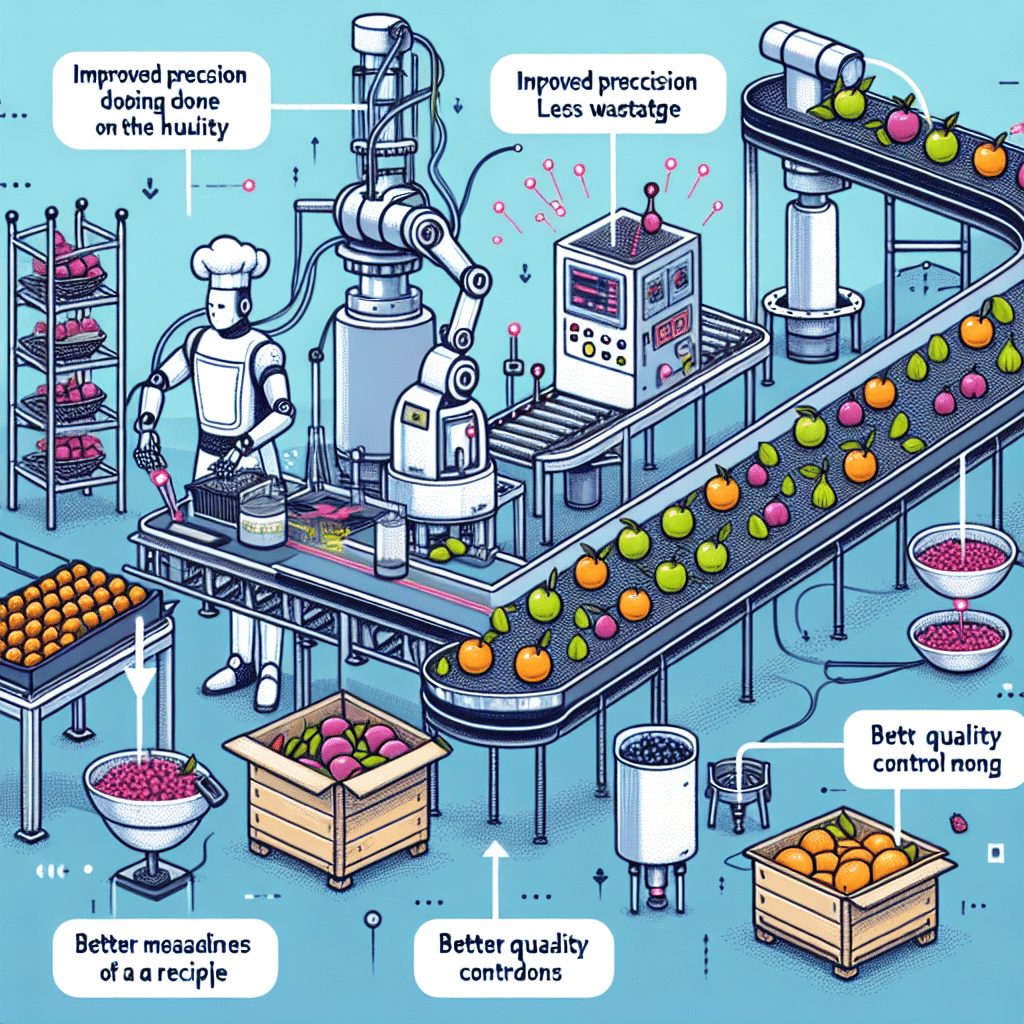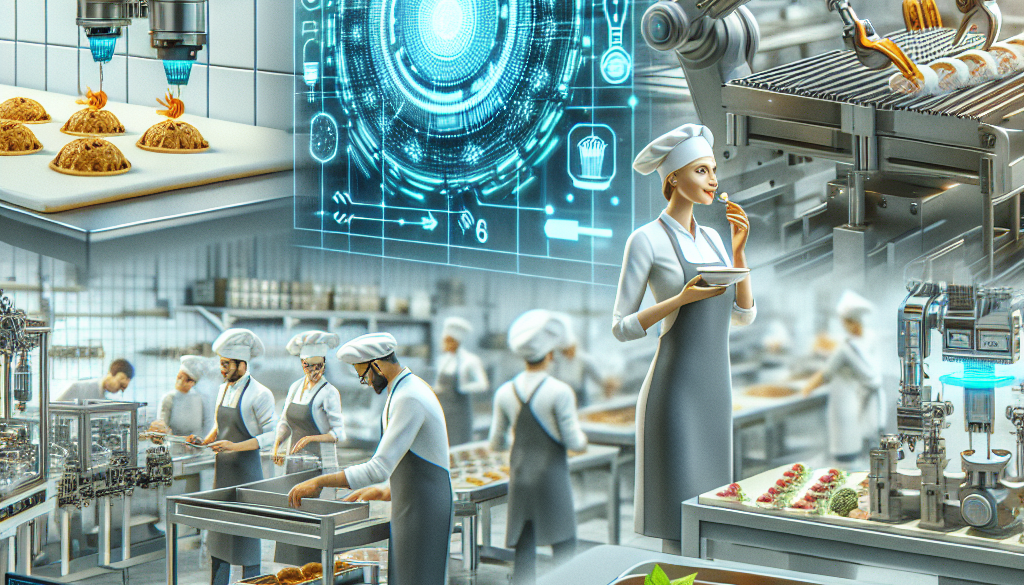Discharching Unfamiliar Advantages of Advanced Tech in the Food Industry
-
Table of Contents
Advanced Tech in the Food Industry: Unveiling Unfamiliar Advantages

The food industry is undergoing a transformation, with advanced technology playing a pivotal role in reshaping how we produce, process, and consume food. From farm to fork, technological innovations are not only improving efficiency and sustainability but also unveiling a host of unfamiliar advantages that are changing the landscape of the food sector. In this article, we will explore these lesser-known benefits of advanced technology in the food industry and how they contribute to a more robust and future-proof food system.
Enhanced Food Safety and Traceability
One of the most significant advantages of advanced technology in the food industry is the improvement in food safety and traceability. With the integration of blockchain technology and Internet of Things (IoT) sensors, it is now possible to track the journey of food products from the farm to the consumer’s plate with unprecedented precision.
- Blockchain technology ensures a transparent and tamper-proof record of food transactions, which can quickly pinpoint the source of contamination during foodborne illness outbreaks.
- IoT sensors monitor the condition of food during transport, ensuring that temperature-sensitive products like dairy and meat are kept at safe temperatures throughout the supply chain.
According to a study by the Food Marketing Institute and the Grocery Manufacturers Association, the average cost of a single food recall can amount to $10 million in direct costs alone, not including brand damage and lost sales. By leveraging advanced tech for better traceability, the food industry can significantly reduce the risks and costs associated with food recalls.
Optimization of Food Production
Advanced technologies such as artificial intelligence (AI) and machine learning are optimizing food production in ways that were once unimaginable. Precision agriculture, for example, uses AI to analyze data from satellite images and soil sensors to make informed decisions about planting, watering, and harvesting crops.
- AI-driven algorithms can predict crop yields more accurately, leading to better resource allocation and reduced waste.
- Robotic systems are being used to automate tasks like weeding and harvesting, increasing efficiency and reducing the need for manual labor.
Statistics from the Association for Advancing Automation indicate that robot orders in the North American food and consumer goods industry grew by 56% in the first nine months of 2021 compared to the same period in 2020. This surge reflects the industry’s growing reliance on automation to meet production demands.
Reduction of Food Waste
Food waste is a global issue, with approximately 1.3 billion tons of food wasted each year, according to the Food and Agriculture Organization of the United Nations. Advanced technology is tackling this problem head-on by enabling more efficient use of resources and better waste management.
- Smart packaging with sensors can alert consumers when food is about to spoil, encouraging timely consumption or preservation.
- Data analytics can help retailers better predict consumer demand, reducing the amount of unsold food that goes to waste.
By minimizing food waste, the food industry not only conserves valuable resources but also contributes to the reduction of greenhouse gas emissions associated with decomposing food in landfills.
Personalized Nutrition and Food Experiences
Technology is personalizing the way we experience food by catering to individual dietary needs and preferences. With advancements in genomics and biotechnology, consumers can receive personalized nutrition advice based on their genetic makeup.
- 3D food printing allows for the customization of food in terms of shape, texture, and nutritional content, offering new possibilities for those with specific dietary requirements.
- Mobile apps and wearable devices can track dietary intake and provide recommendations for healthier food choices based on real-time data.
A report by Grand View Research predicts that the global personalized nutrition market size will reach USD 16.70 billion by 2028, growing at a CAGR of 15.2% from 2021 to 2028. This growth is indicative of the increasing demand for tailored nutrition solutions enabled by technology.
Conclusion
The food industry is reaping unfamiliar advantages from the deployment of advanced technology, with benefits that extend far beyond the obvious. Enhanced food safety and traceability, optimized production, reduced waste, and personalized nutrition are just a few of the ways in which technology is revolutionizing the sector. As we continue to embrace these innovations, we can expect a more efficient, sustainable, and consumer-centric food industry to emerge.
For those in the food industry looking to incorporate high-quality protein into their products, ETprotein offers a range of organic bulk vegan proteins and L-(+)-Ergothioneine (EGT) that meet the highest standards of purity and quality. Their non-GMO, allergen-free proteins are ideal for a variety of applications, from sports nutrition to health and wellness products.
Recommendation: ETprotein’s High-Quality Protein Products
ETprotein is a leading manufacturer and supplier of organic bulk vegan proteins and L-(+)-Ergothioneine (EGT), offering a diverse range of products that cater to the evolving needs of the food industry. Their commitment to quality, sustainability, and customer satisfaction makes them an excellent choice for businesses looking to enhance their offerings with premium protein solutions.
About ETprotein:
ETprotein, a reputable protein and L-(+)-Ergothioneine (EGT) Chinese factory manufacturer and supplier, is renowned for producing, stocking, exporting, and delivering the highest quality organic bulk vegan proteins and L-(+)-Ergothioneine. They include Organic rice protein, clear rice protein, pea protein, clear pea protein, watermelon seed protein, pumpkin seed protein, sunflower seed protein, mung bean protein, peanut protein, and L-(+)-Ergothioneine EGT Pharmaceutical grade, L-(+)-Ergothioneine EGT food grade, L-(+)-Ergothioneine EGT cosmetic grade, L-(+)-Ergothioneine EGT reference grade and L-(+)-Ergothioneine EGT standard. Their offerings, characterized by a neutral taste, non-GMO, allergen-free attributes, with L-(+)-Ergothioneine purity over 98%, 99%, cater to a diverse range of industries. They serve nutraceutical, pharmaceutical, cosmeceutical, veterinary, as well as food and beverage finished product distributors, traders, and manufacturers across Europe, USA, Canada, Australia, Thailand, Japan, Korea, Brazil, and Chile, among others.
ETprotein specialization includes exporting and delivering tailor-made protein powder and finished nutritional supplements. Their extensive product range covers sectors like Food and Beverage, Sports Nutrition, Weight Management, Dietary Supplements, Health and Wellness Products, and Infant Formula, ensuring comprehensive solutions to meet all your protein needs.
As a trusted company by leading global food and beverage brands and Fortune 500 companies, ETprotein reinforces China’s reputation in the global arena. For more information or to sample their products, please contact them and email sales(at)ETprotein.com today.












